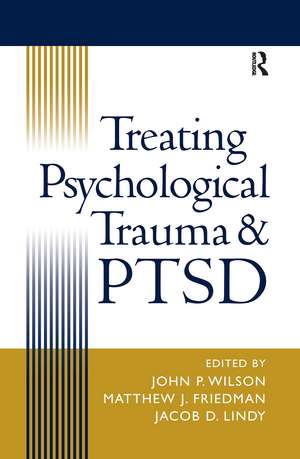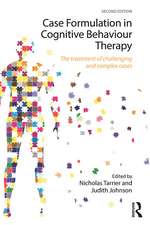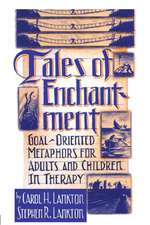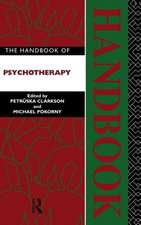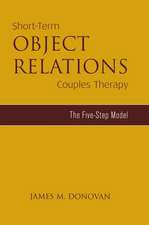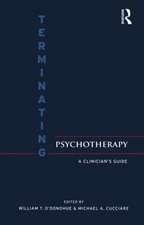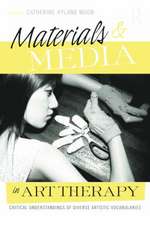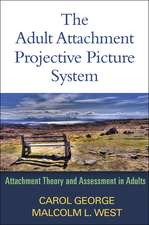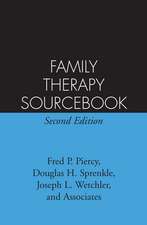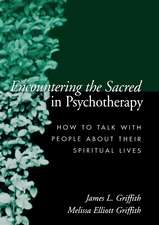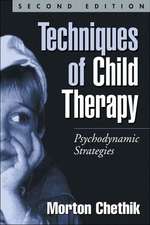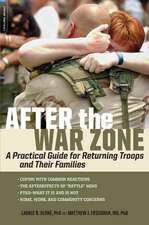Treating Psychological Trauma and PTSD
Editat de John P. Wilson, Matthew J. Friedman, Jacob D. Lindyen Limba Engleză Hardback – 29 noi 2001
Much has been learned about PTSD in the past two decades, yet many questions remain about the complex pathways by which trauma disrupts people's lives. This authoritative volume presents an innovative psychobiological framework to help clinicians and researchers better understand the myriad difficulties facing patients and navigate the array of available intervention approaches. Incorporating the latest theory and clinical research, the book provides a crucial reformulation of diagnostic criteria and treatment goals. It then brings together leading treatment experts to describe and illustrate their respective approaches, facilitating the selection and implementation of the most effective interventions for individual patients.
The book first delineates a holistic, organismic model of PTSD. Particular attention is given to how the concept of allostatic load has enabled contemporary investigators to gain a more dynamic view of human stress responses and how they may go awry. Aided by clearly presented tables and charts, the volume elucidates the process by which traumatic experiences can give rise to 65 symptoms contained within five symptom clusters. Augmenting the traditional domains of PTSD symptomatology/m-/physiological disturbances, traumatic memory, and avoidance/m-/are two additional clusters dealing with frequently encountered problems with self and identity and with attachment, intimacy, and personal relationships. Contributors then provide detailed presentations of core therapeutic approaches: acute posttraumatic interventions, cognitive-behavioral approaches, pharmacotherapy, group psychotherapy, and psychodynamic techniques, as well as approaches for special populations. The concluding section reviews and synthesizes all case material presented, examining which symptoms are addressed by each modality, which treatment objectives are met, and which clients are likely to be helped.
The book first delineates a holistic, organismic model of PTSD. Particular attention is given to how the concept of allostatic load has enabled contemporary investigators to gain a more dynamic view of human stress responses and how they may go awry. Aided by clearly presented tables and charts, the volume elucidates the process by which traumatic experiences can give rise to 65 symptoms contained within five symptom clusters. Augmenting the traditional domains of PTSD symptomatology/m-/physiological disturbances, traumatic memory, and avoidance/m-/are two additional clusters dealing with frequently encountered problems with self and identity and with attachment, intimacy, and personal relationships. Contributors then provide detailed presentations of core therapeutic approaches: acute posttraumatic interventions, cognitive-behavioral approaches, pharmacotherapy, group psychotherapy, and psychodynamic techniques, as well as approaches for special populations. The concluding section reviews and synthesizes all case material presented, examining which symptoms are addressed by each modality, which treatment objectives are met, and which clients are likely to be helped.
| Toate formatele și edițiile | Preț | Express |
|---|---|---|
| Paperback (1) | 370.00 lei 6-8 săpt. | |
| Guilford Publications – 8 apr 2004 | 370.00 lei 6-8 săpt. | |
| Hardback (1) | 745.80 lei 6-8 săpt. | |
| Guilford Publications – 29 noi 2001 | 745.80 lei 6-8 săpt. |
Preț: 745.80 lei
Preț vechi: 785.05 lei
-5% Nou
Puncte Express: 1119
Preț estimativ în valută:
142.73€ • 148.46$ • 117.83£
142.73€ • 148.46$ • 117.83£
Carte tipărită la comandă
Livrare economică 14-28 aprilie
Preluare comenzi: 021 569.72.76
Specificații
ISBN-13: 9781572306875
ISBN-10: 1572306874
Pagini: 467
Dimensiuni: 152 x 229 x 37 mm
Greutate: 0.87 kg
Ediția:New.
Editura: Guilford Publications
Colecția Guilford Press
ISBN-10: 1572306874
Pagini: 467
Dimensiuni: 152 x 229 x 37 mm
Greutate: 0.87 kg
Ediția:New.
Editura: Guilford Publications
Colecția Guilford Press
Public țintă
Professional Practice & DevelopmentCuprins
Contents
I. Theory, Models, and Clinical Paradigms of Treatment
1. Treatment Goals for PTSD, John D. Wilson, Matthew J. Friedman, and Jacob D. Lindy
2. A Holistic, Organismic Approach to Healing Trauma and PTSD, John P. Wilson, Matthew J. Friedman, and Jacob D. Lindy
II. Clinical Treatment of PTSD
3. An Overview of Clinical Considerations and Principles in the Treatment of PTSD, John P. Wilson
4. Allostatic versus Empirical Perspectives on Pharmacotherapy for PTSD, Matthew J. Friedman
5. An Allostatic Approach to the Psychodynamic Understanding of PTSD, Jacob D. Lindy and John P. Wilson
6. Acute Posttraumatic Interventions, Beverley Raphael and Matthew Dobson
7. Cognitive-Behavioral Approaches to PTSD, Lori A. Zoellner, Lee A. Fitzgibbons, and Edna B. Foa
8. Group Psychotherapy for PTSD, David W. Foy, Paula P. Schnurr, Daniel S. Weiss, Melissa S. Wattenberg, Shirley M. Glynn, Charles R. Marmar, and Fred D. Gusman
III. Clinical Treatment Approaches for Special Trauma Populations
9. Treatment of Persons with Complex PTSD and Other Trauma-Related Disruptions of the Self, Laurie Anne Pearlman
10. Dual Diagnosis and Treatment of PTSD, Alexander C. McFarlane
11. Cross-Cultural Treatment of PTSD, J. David Kinzie
12. Treatment Methods for Childhood Trauma, Kathleen Nader
13. Treatment of PTSD in Families and Couples, Laurie Harkness and Noka Zador
14. Treatment of PTSD in Persons with Severe Mental Illness, Kim T. Mueser and Stanley D. Rosenberg
IV. Case History Analysis and Practical Considerations
15. Case History Analysis of the Treatments for PTSD, Jacob D. Lindy, John P. Wilson, and Matthew J. Friedman
16. Practical Considerations in the Treatment of PTSD: Guidelines for Practitioners, John P. Wilson, Matthew J. Friedman, and Jacob D. Lindy
17. Respecting the Trauma Membrane: Above All, Do No Harm, Jacob D. Lindy and John P. Wilson
I. Theory, Models, and Clinical Paradigms of Treatment
1. Treatment Goals for PTSD, John D. Wilson, Matthew J. Friedman, and Jacob D. Lindy
2. A Holistic, Organismic Approach to Healing Trauma and PTSD, John P. Wilson, Matthew J. Friedman, and Jacob D. Lindy
II. Clinical Treatment of PTSD
3. An Overview of Clinical Considerations and Principles in the Treatment of PTSD, John P. Wilson
4. Allostatic versus Empirical Perspectives on Pharmacotherapy for PTSD, Matthew J. Friedman
5. An Allostatic Approach to the Psychodynamic Understanding of PTSD, Jacob D. Lindy and John P. Wilson
6. Acute Posttraumatic Interventions, Beverley Raphael and Matthew Dobson
7. Cognitive-Behavioral Approaches to PTSD, Lori A. Zoellner, Lee A. Fitzgibbons, and Edna B. Foa
8. Group Psychotherapy for PTSD, David W. Foy, Paula P. Schnurr, Daniel S. Weiss, Melissa S. Wattenberg, Shirley M. Glynn, Charles R. Marmar, and Fred D. Gusman
III. Clinical Treatment Approaches for Special Trauma Populations
9. Treatment of Persons with Complex PTSD and Other Trauma-Related Disruptions of the Self, Laurie Anne Pearlman
10. Dual Diagnosis and Treatment of PTSD, Alexander C. McFarlane
11. Cross-Cultural Treatment of PTSD, J. David Kinzie
12. Treatment Methods for Childhood Trauma, Kathleen Nader
13. Treatment of PTSD in Families and Couples, Laurie Harkness and Noka Zador
14. Treatment of PTSD in Persons with Severe Mental Illness, Kim T. Mueser and Stanley D. Rosenberg
IV. Case History Analysis and Practical Considerations
15. Case History Analysis of the Treatments for PTSD, Jacob D. Lindy, John P. Wilson, and Matthew J. Friedman
16. Practical Considerations in the Treatment of PTSD: Guidelines for Practitioners, John P. Wilson, Matthew J. Friedman, and Jacob D. Lindy
17. Respecting the Trauma Membrane: Above All, Do No Harm, Jacob D. Lindy and John P. Wilson
Notă biografică
John P. Wilson, PhD, is Professor of Psychology at Cleveland State University. An internationally recognized expert on PTSD, he is the past president of the International Society for Traumatic Stress Studies. He is the coeditor of [ital]Assessing Psychological Trauma and PTSD[/ital] (with Terence M. Keane) and [ital]Countertransference in the Treatment of PTSD[/ital] (with Jacob D. Lindy).
Matthew J. Friedman, MD, PhD, before retiring in 2022, was founder and Director of the National PTSD Brain Bank; Senior Advisor to the National Center for PTSD, where he served for 24 years as Executive Director; and Professor and Vice Chair for Research in the Department of Psychiatry at the Geisel School of Medicine at Dartmouth. He worked as a clinician and researcher for over 50 years, and has approximately 360 publications, including 29 books.
Jacob D. Lindy, MD, is a training and supervising analyst at the Cincinnati Psychoanalytic Institute. For 27 years he has adapted psychoanalytic clinical theory to the special circumstances of the trauma survivor. He is the past president of the International Society for Traumatic Stress Studies and has just completed 5 years as Director of the Cincinnati Psychoanalytic Institute. His publications include [ital]Countertransference in the Treatment of PTSD[/ital] (coedited with John P. Wilson).
Matthew J. Friedman, MD, PhD, before retiring in 2022, was founder and Director of the National PTSD Brain Bank; Senior Advisor to the National Center for PTSD, where he served for 24 years as Executive Director; and Professor and Vice Chair for Research in the Department of Psychiatry at the Geisel School of Medicine at Dartmouth. He worked as a clinician and researcher for over 50 years, and has approximately 360 publications, including 29 books.
Jacob D. Lindy, MD, is a training and supervising analyst at the Cincinnati Psychoanalytic Institute. For 27 years he has adapted psychoanalytic clinical theory to the special circumstances of the trauma survivor. He is the past president of the International Society for Traumatic Stress Studies and has just completed 5 years as Director of the Cincinnati Psychoanalytic Institute. His publications include [ital]Countertransference in the Treatment of PTSD[/ital] (coedited with John P. Wilson).
Recenzii
Precise and relevant, a comprehensive review of the history, theory, and treatment of PTSD....I find this an essential text in my graduate counseling course.--James Halpern, PhD, Department of Psychology, State University of New York at New Paltz
Wilson, Friedman, and Lindy define the theory of PTSD treatment with authority and clarity. Readers will appreciate how well the volume integrates the scientific, intellectual, and ethical principles for choosing effective clinical interventions. As much a 'why to' as a 'how to' book, this is a volume to be owned by all serious PTSD scholars and practitioners.--Frank M Ochberg, MD, former Associate Director, National Institute of Mental Health
The perennial request of trauma practitioners is 'Give me something I can use--something practical!' This text defines the major themes of recovery across populations and relates these goals to specific interventions and techniques. Adding the areas of attachment/intimacy and interpersonal relationships and self/identity and life course development to the 'basic three' of PTSD (intrusion, avoidance, physiological symptoms) fills in previously missing gaps. This is one of the first volumes to address PTSD treatment from a non-unitary perspective, acknowledging that traumatic responses exist on a continuum and presenting treatment goals that apply to all aspects of the disorder. It is a great step forward and a 'must read.'--Mary Beth Williams, PhD, LCSW, CTS, coauthor of Life after Trauma
The construct of PTSD and its underlying theory have been challenged by recent advances in research and practice. This book makes a daring attempt to redraw the picture, representing a sort of conceptual avant-garde. Using the construct of allostatic load, the book offers new theory and clinical approaches. The reader will find novelty, excitement, controversy, and much food for thought.--Arieh Y. Shalev, MD, Department of Psychiatry, Hadassah University Hospital, Israel
-Wilson, Friedman, and Lindy define the theory of PTSD treatment with authority and clarity. Readers will appreciate how well the volume integrates the scientific, intellectual, and ethical principles for choosing effective clinical interventions. As much a 'why to' as a 'how to' book, this is a volume to be owned by all serious PTSD scholars and practitioners.--Frank M Ochberg, MD, former Associate Director, National Institute of Mental Health
The perennial request of trauma practitioners is 'Give me something I can use--something practical!' This text defines the major themes of recovery across populations and relates these goals to specific interventions and techniques. Adding the areas of attachment/intimacy and interpersonal relationships and self/identity and life course development to the 'basic three' of PTSD (intrusion, avoidance, physiological symptoms) fills in previously missing gaps. This is one of the first volumes to address PTSD treatment from a non-unitary perspective, acknowledging that traumatic responses exist on a continuum and presenting treatment goals that apply to all aspects of the disorder. It is a great step forward and a 'must read.'--Mary Beth Williams, PhD, LCSW, CTS, coauthor of Life after Trauma
The construct of PTSD and its underlying theory have been challenged by recent advances in research and practice. This book makes a daring attempt to redraw the picture, representing a sort of conceptual avant-garde. Using the construct of allostatic load, the book offers new theory and clinical approaches. The reader will find novelty, excitement, controversy, and much food for thought.--Arieh Y. Shalev, MD, Department of Psychiatry, Hadassah University Hospital, Israel
An authoritative volume that should be on the required reading list for any serious course on trauma, stress, posttraumatic stress disorder (PTSD), victimology, or abnormal psychology or clinical psychology practicum....It broadens the reader's perceptions of psychopathology and provides a much-needed lens for understanding both catastrophic trauma and the inevitable, pervasive, smallerbut commontrauma that goes unrecognized in everyday life.[Chapters] are informed by the latest theory and clinical research and describe a broad array of effective interventions and fine-tuned treatment goals.
--Psychiatric Services, 1/15/2004ƒƒThis scholarly and lucid book offers a comprehensive, 'state-of-the-art' schema for the treatment of multiple aspects of psychological trauma....Will positively affect trauma research and treatment over the next decade.
--International Journal of Group Psychotherapy, 1/15/2004Descriere
This volume presents an innovative psychobiological framework for understanding and treating PTSD. A major emphasis is the need to reformulate diagnostic criteria and treatment goals to reflect emerging knowledge about the complex pathways by which trauma disrupts people's lives. Within a holistic, organismic framework, the editors identify 65 PTSD symptoms contained within five (rather than the traditional three) symptom clusters, and spell out 80 target objectives for treatment. Expert contributors then provide detailed presentations of core therapeutic approaches, including acute posttraumatic interventions, cognitive-behavioral approaches, pharmacotherapy, group psychotherapy, and psychodynamic techniques, as well as approaches to working with specific populations, including children, refugees, and the dually diagnosed. The concluding section reviews and synthesizes all case material presented, examining which symptoms are addressed by each of the core approaches, which treatment goals are met, and which clients can most effectively be helped. Combining cutting-edge theoretical exposition with clear-cut recommendations for practice, this is an ideal resource for clinicians, students, and researchers.
